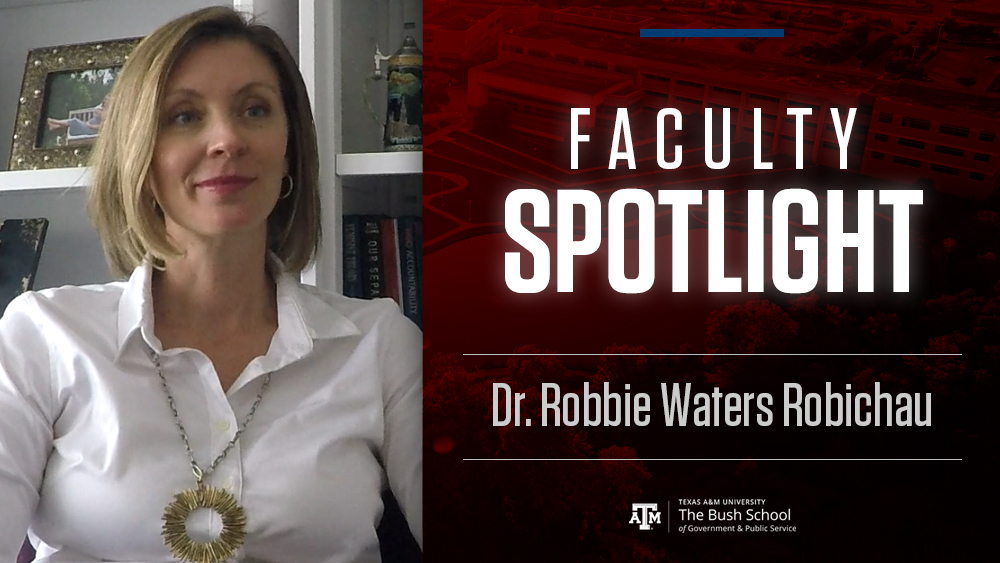
Robbie Waters Robichau teaches public service and administration in the nonprofit sector, with courses touching on foundations of the nonprofit sector, human relations, and social entrepreneurship and innovation. She is a Bush School alumna, studying nonprofit management and accountability, capacity and evaluation, and meaningfulness in public service work.
What research project are you currently working on?
The project I’m most excited about right now is with anti-human trafficking organizations here in Texas. I’m trying to understand the experience of nonprofit and public workers who do trauma-informed care to help trafficked victims and survivors in Texas. I’m examining how meaningfulness-making, emotional labor, and secondary work-trauma all connect in positive and negative ways to affect workers and their organizations. The goal is to figure out best practices for those public servants who are doing personally meaningful and socially impactful work but are struggling to stay in their jobs because emotionally, it’s hard.
What are you hoping to learn through your research?
In nonprofits, when you do your work and you enjoy your work, you do it better, and therefore the clients you’re serving are better off. How do we create organizations, whether through management or human-resource retention practices, that better empower people to make decisions about how to do their job? My research is focused on whether you’re more satisfied in life because of the work you’re doing. Workers who are more engaged and committed to their work may perform better helping organizations and clients alike.
There are a lot of practical implications, and it’s not just about the organizational outcomes. Public servants are workers, but they are also citizens. If we want to improve our citizenry, and even our democracy, we must treat people better in the workplace. We have to encourage public servants to consider how their work affects their beneficiaries, who are equally a part of democracy. In jobs where people can enjoy and find meaning in their work by serving others, everyone wins.
What do you like most about working at the Bush School?
The culture is public service-focused. I’ve been in other institutions, and they don’t have the same culture. Our faculty, our staff, and definitely our students really believe that public service is a noble calling. I love the idea that here at the Bush School we get to be part of a community of people who are public servants and who want to make society better in their own unique ways.
Have you ever worked outside of academia? If so, what did you do, and how does that experience inform your research and teaching?
I’ve always really been engaged in the nonprofit community from a volunteer perspective. I get my practical experience recruiting and managing volunteers. I have worked for a nonprofit called Teen Reach Adventure Camp for over a decade. We do summer camps for youth in foster care ages twelve to fifteen years old. I get the opportunity to recruit and manage a couple hundred volunteers. Then I also work with the kids in foster care who come to camp through facilitating challenge course and team-building activities. I have also spent time raising funds and doing programming. I know what it’s like to be a volunteer and feel underappreciated, so I know how important it is to show appreciation for the volunteers you have.
What research or teaching accomplishment are you most proud of and why?
I am really excited that I have research that has been cited in the EU and in Australian government reports. But I’ll just be honest—this meaningfulness-in-public-service-work research I’m doing is currently one of my big projects near and dear to my heart. When I talk to people in the field, they get excited to hear that there are public servants out there who find their jobs highly meaningful and who stay in those jobs because they think they’re going to impact beneficiaries. My most exciting accomplishment right now is being able to engage with people and help them see that just talking about what makes your work meaningful helps you find more meaning in your work.
What is your favorite class to teach and why?
My favorite class is social innovation and entrepreneurship. What’s great about this class is that students from across the University take it. The idea is to create a social business plan around a social issue. It’s one of those last semester classes for most students where everything they’ve been learning across the Bush School, whether it’s grant writing or program evaluation or even policy implementation, comes together. How do you do all that if you start from scratch?
The goal here is not necessarily that everyone’s going to go start a nonprofit, but they could innovate in the programs they’re in. Students really like the idea that you can develop innovation and creativity in your workplace.
